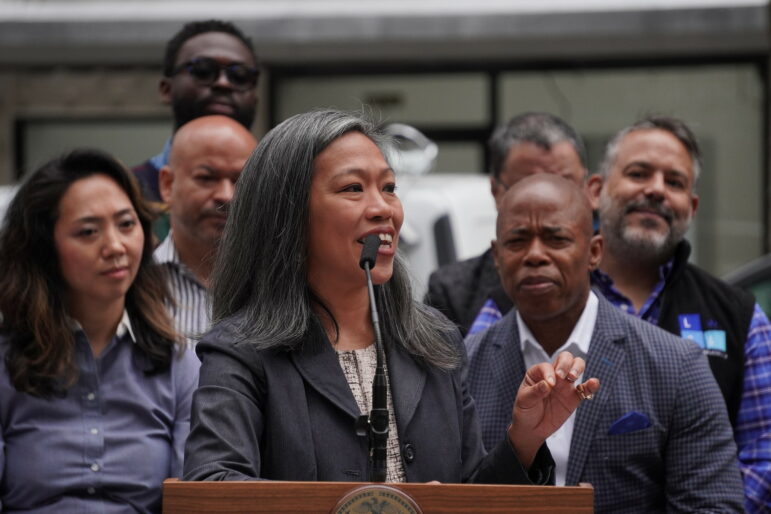Advocates had hoped Adams would kick off his first term by appointing a deputy mayor for housing and homelessness—ensuring that previously siloed agencies would report to the same person. He didn’t, but departing administration member Jessica Katz was the next best thing, they say.

Ed Reed/Mayoral Photography Office
Mayor Eric Adams and Chief Housing Officer Jessica Katz unveiling the administration’s housing plan in June 2022.Asked how she feels about the impending departure of Jessica Katz, chief housing officer under Mayor Eric Adams, Nicole Branca, executive director of New Destiny Housing, put it this way: “They picked the best person for the job that it almost was.”
Branca, whose organization helps find apartments for homeless domestic violence survivors and their children, had hoped Adams would kick off his first term by appointing a deputy mayor for housing and homelessness—ensuring that previously siloed agencies would report to the same person. He didn’t, but Katz was the next best thing.
After Branca’s organization received a contract to administer lucrative federal Emergency Housing Vouchers, Katz was always a phone call away. “Whenever we hit a wall we could call Jessica’s office and we saw her work through some of those bottlenecks for us so we could move survivors faster,” Branca said.
About one year ago, Katz released an ambitious plan with her focus reflected in the title—“Housing Our Neighbors: A Blueprint for Housing and Homelessness.” It called for new development, but also emphasized improving conditions in public housing and streamlining processes for moving unhoused New Yorkers into permanent homes.
In an exclusive May 24 interview with Gothamist, Katz announced she will depart in July, calling the job a “real sprint” and adding that now is the right time, having worked her way down a list of goals for the role.
Mayor Adams described her tenure as critical in a statement, adding that she “worked every day to ensure that New Yorkers were at the center of our housing policies.”
He credited her for successfully lobbying for rental assistance for public housing residents this year—during a budget season with few housing investments—and helping to establish the Preservation Trust, a plan to to transfer 25,000 NYCHA apartments into a publicly owned trust with the power to issue bonds and borrow money to fund repairs.
Exits from shelter to permanent housing also increased last summer compared to the year prior, a shift the city has attributed in part to the increase in the value of city-issued rental subsidies known as CityFHEPS vouchers, which can cover the bulk of rent for low-income families and individuals.
Though that change predated Katz’s tenure, she left her mark with new rules that, among other things, loosened work requirements to qualify for those vouchers. “It wasn’t nearly enough but they did make some progress,” said Joshua Goldfein of the Legal Aid Society.
Challenges internal and external
Katz could have pushed her agenda even further if she’d been given more power, according to Ricardo Martínez Campos, former director of the Mayor’s Office to Protect Tenants who briefly overlapped with her in 2022. “Jessica’s a fixer,” he said. “She’s there to make bureaucracies work.”
The fact that she didn’t directly oversee any homelessness or social services agencies was a handicap, some said. One former colleague saw a metaphor in the location of her office, not at City Hall but at 253 Broadway across the street, where the chief climate officer is also housed — “It just felt really not prioritized.”
Not that it would have necessarily been simple to give Katz a portfolio to match her mission, acknowledged Catherine Trapani, executive director of Homeless Services United. Such a reorganization would have been complex, particularly given the sheer size of the Human Resources Administration, which administers rental subsidies, and the ongoing coronavirus pandemic.
But with Deputy Mayor Maria Torres-Springer poised to absorb Katz’s portfolio in a new role covering housing and economic and workforce development — not homeless services — some advocates fear the silos they hoped to break down will be reinforced.
“Now with both Jessica and the Chief Housing Officer position out, we are left right where we started… without the coordination we called for and the greatest homelessness crisis we’ve faced in decades upon us,” wrote Iziah Thompson, senior policy analyst for the Community Service Society (a City Limits funder), in an email.
The nightly shelter population in New York City was about 83,000 as of May 29, compared to about 47,200 when Katz was appointed in late January of last year.
An influx of asylum seekers to the city has added pressure to the system: more than 21,000 immigrants were housed in emergency hotel shelters run by the Department of Homeless Services as of March. Thousands more are receiving city aid outside of traditional shelters.
A person familiar with City Hall’s thinking said the important work of serving and sheltering asylum seekers interrupted some of Katz’s other projects. “There’s no question that the size of this crisis has drawn resources that would have otherwise gone to long-term planning and other initiatives,” they said.
Passing the baton
Some sources inside and outside City Hall said the new leadership structure, with Torres-Springer at the helm, will be less confusing.
They described a counterproductive split between Katz and Torres-Springer’s jurisdictions. The former oversaw Housing Preservation and Development, or HPD, which tackles affordable housing development and preservation, while the latter had purview over the Department of City Planning, or DCP, which spearheads neighborhood-level planning.
It wasn’t always clear who was responsible for what, according to one former official who worked under both former Mayor Bill de Blasio and Adams. For example, they said, DCP is exploring a zoning amendment to encourage “shared housing models” such as single-room occupancy housing, or SROs. This option could be a boon for homeless New Yorkers but didn’t have an obvious lead between Katz and Torres-Springer.
Many who have worked with Torres-Springer over the years described her as a skillful manager who can handle a large portfolio. She also served as HPD commissioner under de Blasio, for a stretch of years when the city was financing a historically high volume of housing. (Katz also worked at HPD under de Blasio.)
Construction starts for city-subsidized affordable housing dropped off dramatically in the year ending last June, covering part of Katz’s tenure. The city attributed this in an annual report to factors including short staffing at HPD and high construction costs.
In a statement, Mayor Adams praised Torres-Springers’ “proven record of creating affordable housing and economic opportunity for New Yorkers.”
Former City Council speaker Christine Quinn, now executive director of Win, the city’s largest family shelter provider, said Torres-Springer understands that homeless New Yorkers also need a strong jobs advocate.
“If you don’t have a home it is incredibly challenging as it relates to getting and keeping a job,” she told City Limits. “But if you don’t have a good job, you can’t keep that home. She sees that in a profound way that builds off of Jessica’s work.”
Baaba Halm, vice president and New York market leader of the nonprofit housing developer Enterprise Community Partners, worked under Torres-Springer at HPD. She noted that her former boss has also served on the board of directors for the New York City Housing Authority, or NYCHA, which she will now oversee.
“While we’re talking about an expanded portfolio it’s a natural portfolio,” Halm said.
But others said the size of Torres-Springer’s new mandate is worth keeping an eye on, noting that working to improve conditions for public housing tenants living in NYCHA is a time-consuming job that got much needed attention from Katz.
“The biggest thing I would be concerned about in a large portfolio world is NYCHA,” said one former city official. “NYCHA didn’t get this type of attention and love in different administrations.”
Critical moment
At a panel discussion at NYU’s Furman Center last month, just before news broke of her expanded role, Torres-Springer framed the homelessness crisis in a way some advocates recognized as Katz-esque.
“A lot of what I think we have learned as a city, and where we need to continue to go deeper in terms of policy, is understanding the issue of homelessness, the issue of the unhoused, as being a housing issue,” Torres-Springer told moderator David Brand, of WNYC/Gothamist.

Benny Polatseck/Mayoral Photography Office
Deputy Mayor Maria Torres-Springer at a press conference last year.This “starts with building as much as we can,” Torres-Springer said, adding that it will also be important to prevent families from becoming homeless in the first place, and to generate supportive housing—apartments where a rental subsidy administered by the city or state is paired with dedicated mental health services.
Branca of New Destiny said she’d still like to see a person or group within City Hall focused solely on the intersection of housing and homelessness. If not a chief housing officer or deputy mayor, perhaps an inter-agency council on homelessness.
Beyond organizational charts, added Trapani of Homeless Services United, City Hall could assure the public that homelessness is being addressed head on by further streamlining the rental voucher process.
Right now, she said, Adams could sign a suite of bills recently passed by the City Council that would remove a rule that New Yorkers must stay in shelter for 90 days before being eligible for CityFHEPS vouchers. The legislation would also raise the income eligibility threshold to 50 percent of the area median income, or $49,450 for a single adult.
“They’re making eligibility so much more straightforward that it will presumably also be easier to administer and you don’t make people jump through 87 hoops just to get vouchered and linked to an apartment,” Trapani said.
But Adams has been critical of the bills, arguing that they will be too costly, and will increase competition for current voucher holders already struggling to find an apartment.
Joseph Loonam, campaign coordinator for the Homeless Union within VOCAL-NY, views the package as a litmus test for the city’s homelessness response, at a crucial moment with Katz headed out the door.
“If the administration embraces it, it’s a sign to us that they are taking the issue more seriously than previous administrations, and they really do want to work with the City Council on concrete solutions,” he said. “If a veto is attempted in the midst of such a high profile exit, it’s a sign to us that the administration is in some real chaos and that they don’t really have a unified position on this crisis.”









One thought on “The Job That “Almost Was”: Advocates on the Loss of NYC’s Chief Housing Officer”
We don’t need another deputy mayor of anything! Let’s start building on all this vacant land that the city owns – – http://u.pc.cd/CTm